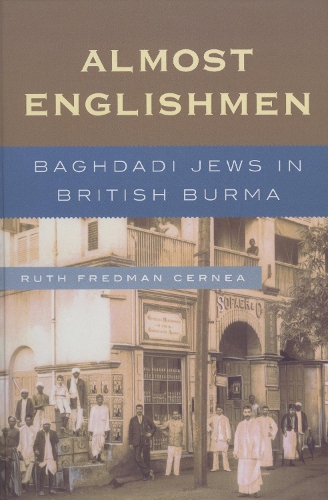
Almost Englishmen: Baghdadi Jews in British Burma
(Hardback)
Available Formats
Publishing Details
Almost Englishmen: Baghdadi Jews in British Burma
By (Author) Ruth Fredman Cernea
Bloomsbury Publishing PLC
Lexington Books
1st December 2006
United States
Classifications
General
Non Fiction
Social and cultural history
305.89240591
Physical Properties
Hardback
202
Width 161mm, Height 242mm, Spine 18mm
449g
Description
Before the Second World War, two golden "promised lands" beckoned the thousands of Baghdadi Jews who lived in Southeast Asia: the British Empire, on which "the sun never set," and the promised land of their religious tradition, Jerusalem. Almost Englishmen studies the less well-known of these destinations. The book combines history and cultural studies to look into a significant yet relatively unknown period, analyzing to full effect the way Anglo culture transformed the immigrant Bagdhadi Jews.
England's influence was pervasive and persuasive: like other minorities in the complex society that was British India, the Baghdadis gradually refashioned their ideology and aspirations on the British model. The Jewish experience in the lush land of Burma, with its lifestyles, its educational system, and its internal tensions, is emblematic of the experience of the extended Baghdadi community, whether in Bombay, Calcutta, Shanghai, Singapore, or other ports and towns throughout Southeast Asia. It also suggests the experience of the Anglo-Indian and similar "European" populations that shared their streets as well as the classrooms of the missionary societies' schools. This contented life amidst golden pagodas ended abruptly with the Japanese invasion of Burma and a horrific trek to safety in India and could not be restored after the war. Employing first-person testimonies and recovered documents, this study illuminates this little known period in imperial and Jewish histories.
Reviews
The author has done a service to Jewish studies by this engagingly written book, documenting a community that has largely disappeared. She has also done a service to the descendants of the people described, who are enabled through this book to recognize their ancestral roots. * Shofar: An Interdisciplinary Journal Of Jewish Studies *
Well-written with hardly a trace of politically-correct jargon or formulaic social-science talk . . . quite literary in its style. . . . [Cernea] seems to write . . . for general readers as well as the people it directly concerns. -- 2008 * Asian Journal of Social Science *
Almost Englishmen offers a painstaking record of the rise, flourishing, and slow death of the prosperous community of Baghdadi Jews in Burma (today's Myanmar.) With the keen eye and sympathetic ear of the anthropologist, Cernea has gathered the memories and contemporary impressions of a lost world of merchants at once devoted to tradition and enchanted by the cosmopolitan modernity of British India. * H-Net: Humanities and Social Science Reviews Online *
The book is of interest to academics as well as non-academics who are personally committed to the history of the Jewish diaspora in South(East)-Asia. . . .Cerneas analysis provides material for comparative anthropological as well as sociological and political research which is concerned with the establishment of religious minorities abroad. It offers a contribution to the analysis of international migratory movements in terms of patterns of assimilation, and the socio-political role and rights of religious minorities within the contexts of statehood and citizenship before and after colonialism. * Allegra Lab: Anthropology, Law, Art & World *
This newly published volume is a delight: an easy read offering a fascinating account of the lives and times of the small but significant Jewish communitynumbering some 2,100 at their peakof Baghdadi origin in Burma (Myanmar) during and immediately after the Raj. It is illustrated with evocative photos and inventories of community members and their subsequent emigration details. -- David Simon * Hadashot *
Author Bio
Anthropologist Ruth Fredman Cernea has been researching the history of the Baghdadi Jewish communities of Southeast Asia since her first visit to Burma in 1987.
